Real Property on the Multistate Essay Exam: Highly Tested Topics and Tips
 Real Property on the Multistate Essay Exam: Highly Tested Topics and Tips
Real Property on the Multistate Essay Exam: Highly Tested Topics and Tips
Real Property is regularly tested on the MEE. Here, we give you tips for approaching Real Property on the MEE and we reveal some of the highly tested issues in Real Property MEE questions.
Real Property on the Multistate Essay Exam
1. First, be aware of how Real Property is tested
Real Property is tested, on average, about once a year. Real Property is generally tested on its own and not combined with another subject.
Real Property can be a challenging subject for many students. To prepare for Real Property on the MEE, it is best to begin by focusing on the highly tested issues. Also make sure to understand key Real Property vocabulary, as we discuss below.
2. Be aware of the highly tested Real Property issues
The examiners tend to test several of the same issues in Real Property MEE questions. You can maximize your score by being aware of these highly tested issues. (We have a nice summary of these in our MEE One-Sheets if you want to see all of them and have them all in one place.)
Some of the highly tested Real Property Multistate Essay Exam issues include:
Deeds
Deeds are frequently tested when Real Property is tested on the MEE. Remember that there are two different types of deeds: general warranty deeds and quitclaim deeds.
- With a quitclaim deed, the grantee receives whatever interest the grantor has in the property. There are no warranties.
- A general warranty deed has six covenants: right to convey, seisen, no encumbrances, further assurances, quiet enjoyment, and warranty.
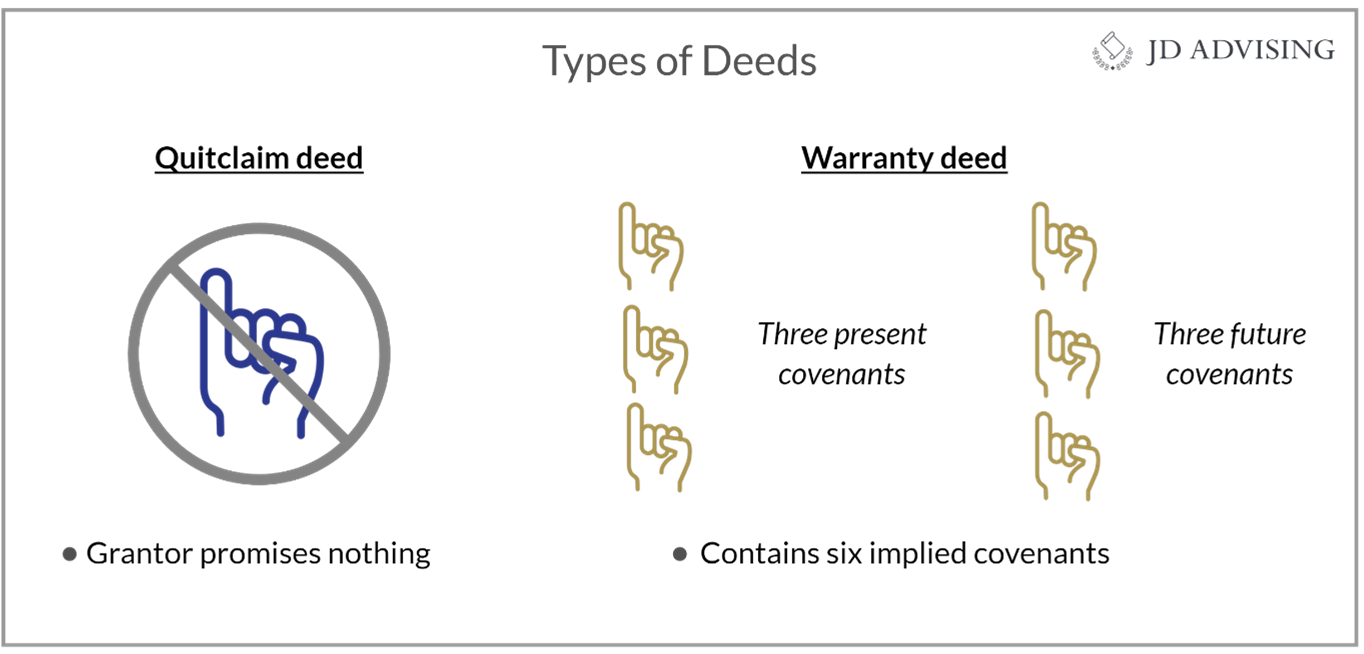
Recording acts
If you see a recording act issue tested, you should start your answer by discussing the common law default rule of first-in-time first-in-right.
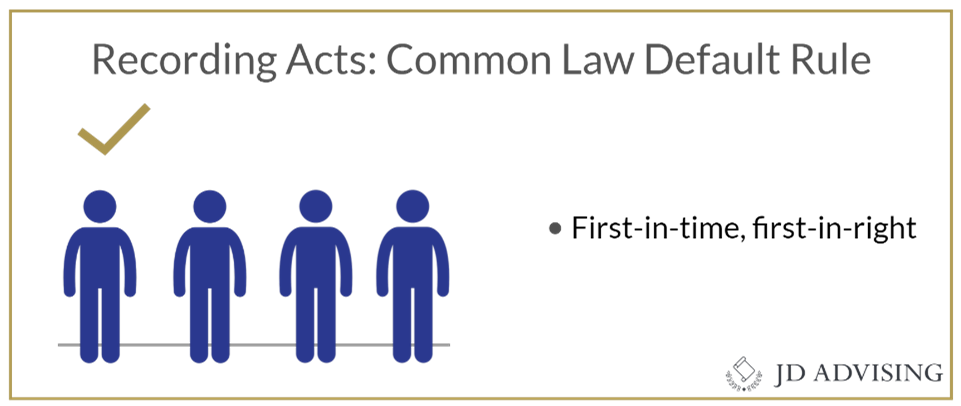
Remember that a grantor can only convey the rights the grantor has at the time of conveyance. Many states have implemented recording acts that change the common law result. There are three different types of recording acts:
- Notice acts: The language of a notice recording act will be something like, “A conveyance of interest in land is not valid against any subsequent purchaser for value without notice unless it is recorded.” This act has the word “recorded” but says nothing about recording first.
- Race-notice acts: The language of a race-notice act will be something like, “No conveyance of an interest in land is valid against any subsequent purchaser for value without notice unless it is recorded first.” This act mentions both notice and “recording first, which is your cue it is a race-notice act!
- Pure race acts: Pure race acts protect a subsequent purchaser who records first. These are rare and are virtually never tested!

Landlord-tenant law
Landlord-tenant law turns up frequently in Real Property on the MEE. Be aware of the following points:
- Assignment of a lease or subleasing is permitted as long as there is no language in the original lease prohibiting it.
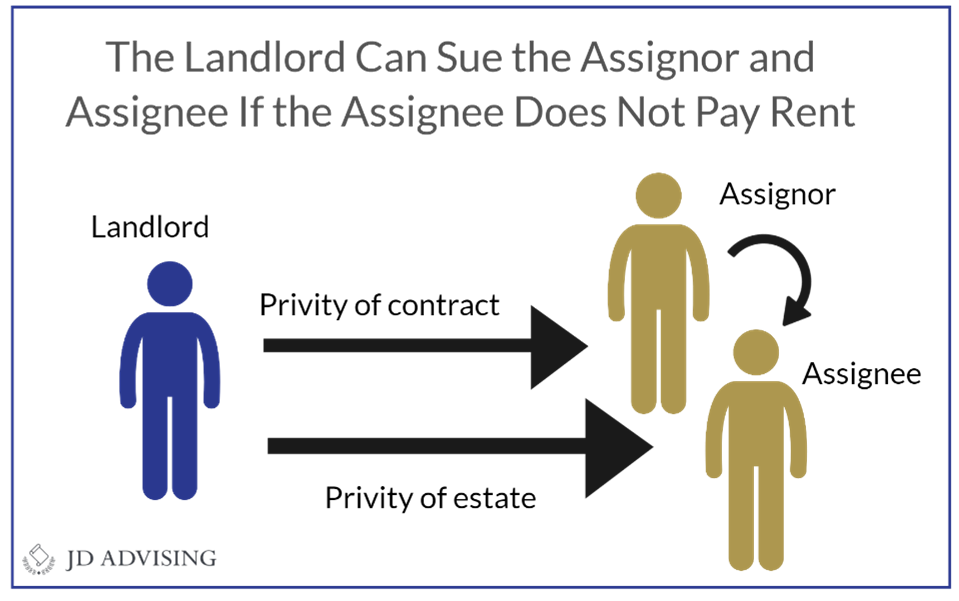
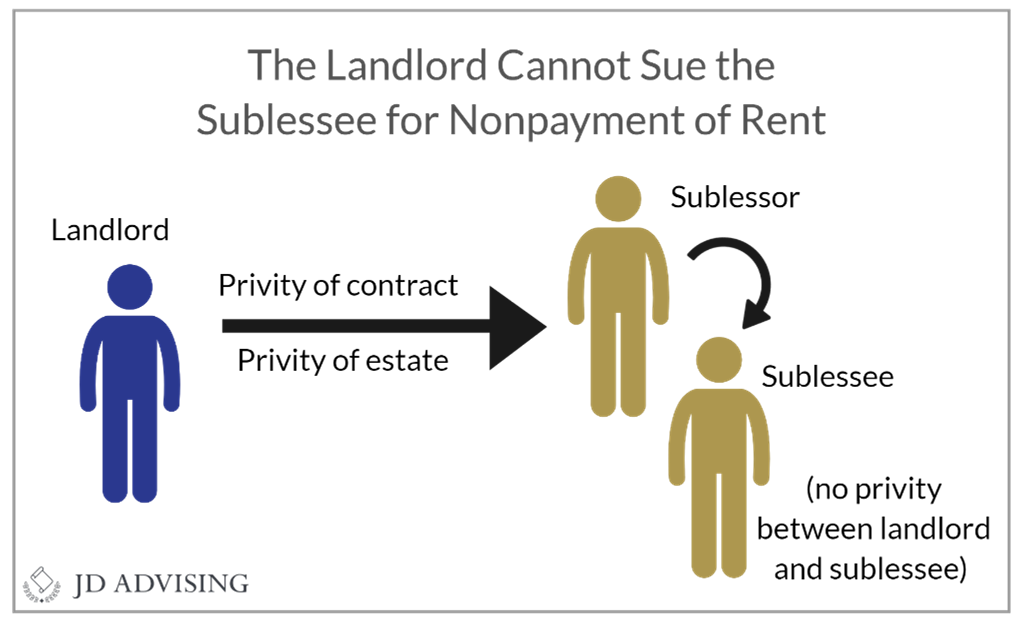
- The tenant has specific duties, including the duty to pay rent. If the tenant does not pay rent but has abandoned the property, the landlord can sue the tenant for damages or treat it as a surrender. Under the common law, the landlord has no duty to mitigate damages. However, many states have instituted their own laws requiring landlords to make a reasonable attempt to mitigate damages.
- The landlord also has specific duties, including the implied warranty of habitability—which requires the landlord to deliver residential premises in habitable condition—and the covenant of quiet enjoyment—which prohibits the landlord from interrupting the tenant’s enjoyment of the premises or making the premises unsuitable.
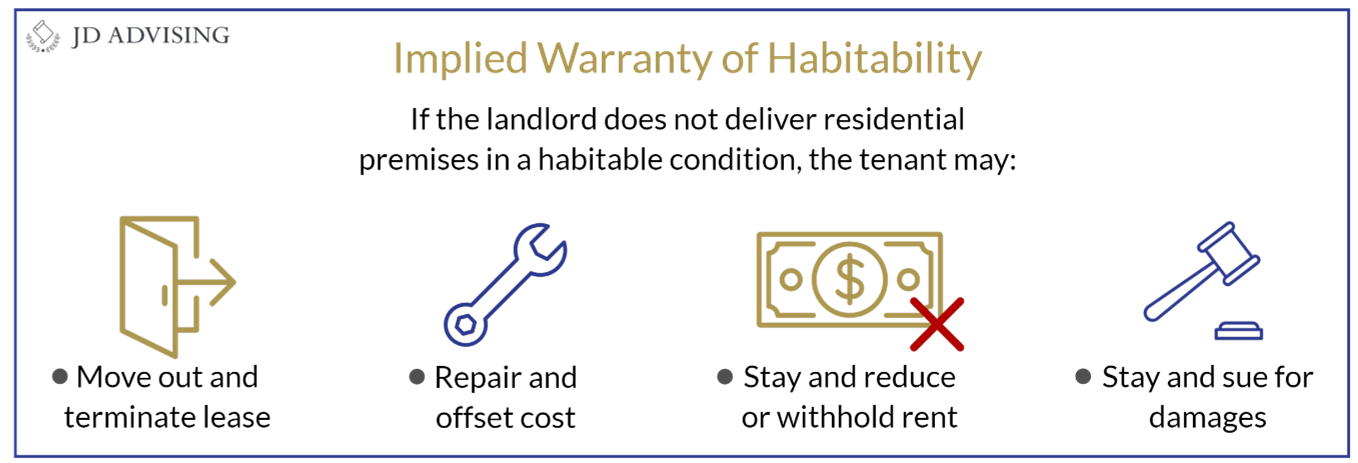
3. Learn Real Property vocabulary
Not only is it important to understand and be able to define key terms, but it is also a good idea to bold and underline Real Property buzzwords on your MEE answers. By doing so, you will draw the grader’s attention to them and maximize your potential points.
Here are a few Real Property terms you should be aware of:
- Warranty deed: contains six warranties (or covenants).
- Quitclaim deed: contains no covenants.
- Merger: once the closing occurs, the contract “merges” with the deed and the buyer can only sue on the deed at that point.

- Wild deed: a deed that is not properly recorded in the chain of title and is outside the chain of title.
- Mortgagor: the party responsible for the mortgage.
- Mortgagee: The bank (or whoever lends money in exchange for a security interest). If you mix up the terms “mortgagor” and “mortgagee” remember that “it is better to be the mortgagee!”
- Term-of-years lease: This term is deceiving because it does not have to be for years. This type of lease just has a specific start and end date. You can also think of this as a “fixed term” lease.
- Assignment: the tenant grants all the time remaining on the lease to the assignee.
- Sublease: the tenant grants only part of the time on the lease and still has an interest in the property.
- Easement: The non-possessory right to use the property of another. In other words, an easement holder does not own the property that is subject to the easement; it merely has a right to use the property.
- Joint tenancy: When parties own an equal interest in land with the right of survivorship (as opposed to tenants in common, where there is no right of survivorship).
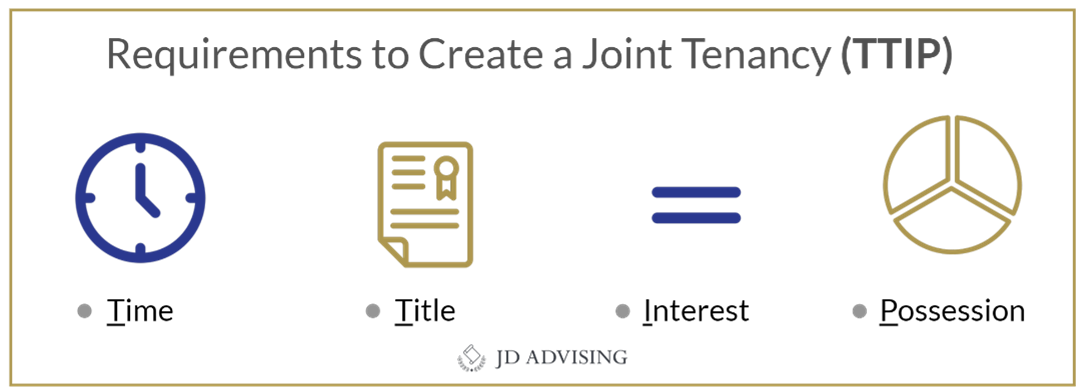
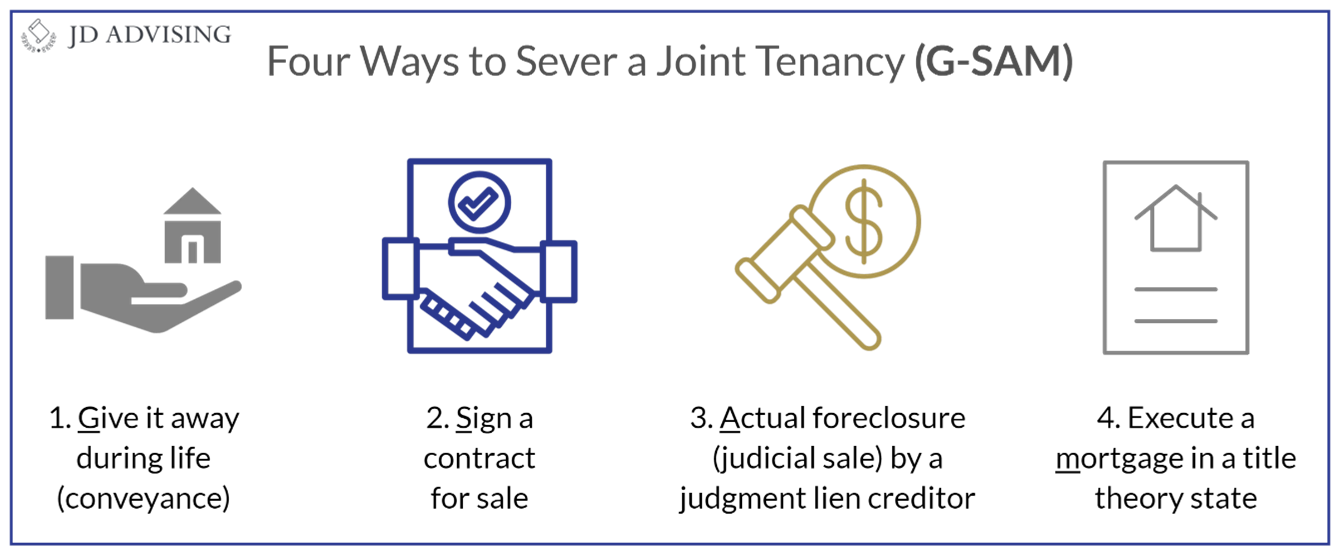
- Adverse possession: when a party possesses land adversely (e.g., without permission), that party can become the true owner of the land after the statutory period has passed.
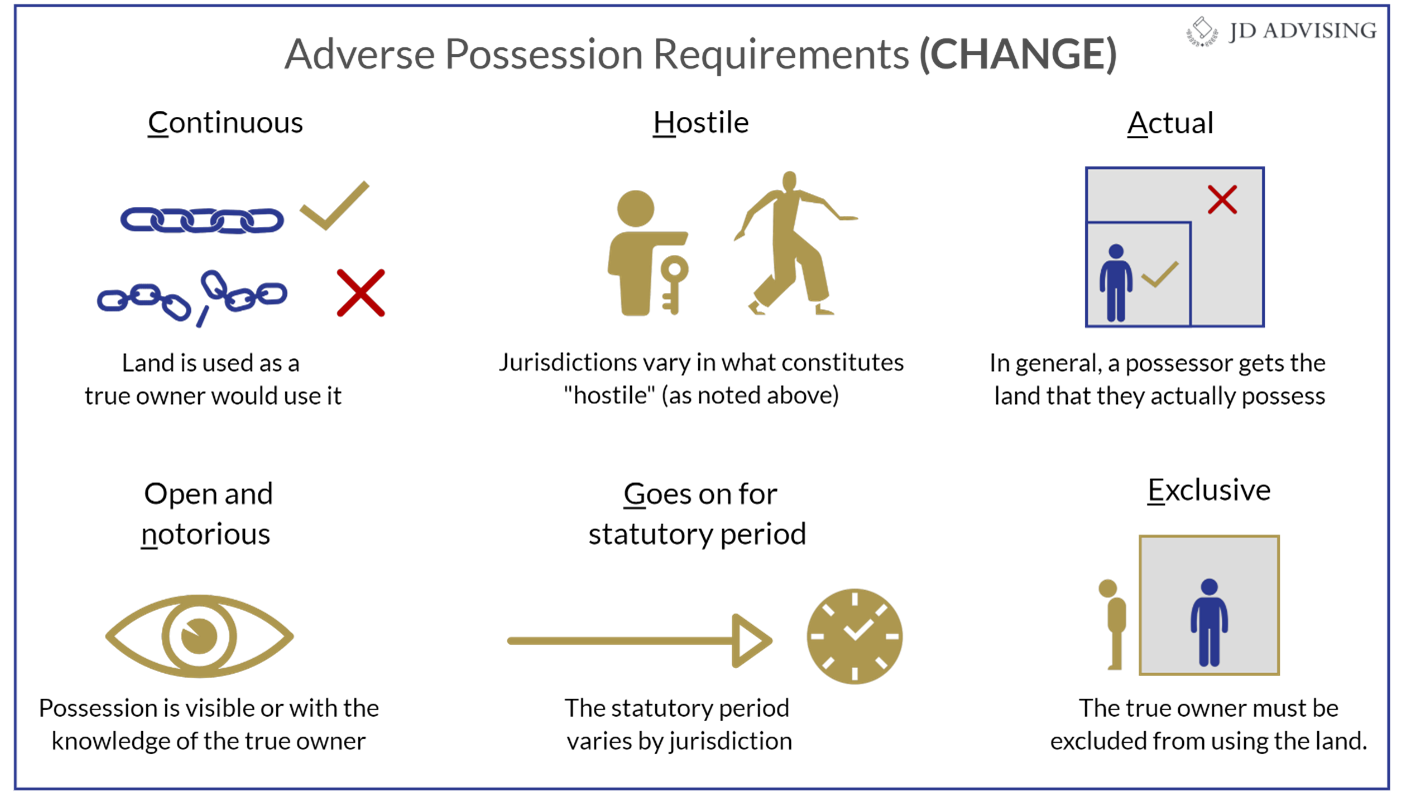
4. Practice!
Practice is critical if you want to master Real Property on the MEE. As an added bonus, you may also see your MBE score improve if you practice writing answers to Real Property MEE essays.
Note that since many Real Property issues are tested repeatedly, practice can make a big difference. For example, many of the same concepts in February 2018 were tested in February 2010! Any student who completed the February 2010 question would have been well prepared for the Real Property MEE on the February 2018 exam.
Here, we have provided you with some links to free Real Property MEE questions and NCBE point sheets. (If you would like to purchase a book of Real Property MEE questions and NCBE point sheets, check out our MEE books here. You can also see some additional exams on the NCBE website for free here.)
- February 2023 Real Property MEE: this MEE covers adverse possession; color of title and constructive adverse possession; tacking for cause of action; and tolling of statute of limitations for disability (minor).
- July 2022 Real Property MEE: this MEE covers life estate, vested remainder, and duties of a life tenant; fee simple determinable and possibility of reverter; devisability, and RAP.
- February 2015 Real Property MEE: this MEE covers adverse possession and deeds.
- July 2013 Real Property MEE: this MEE covers deeds, merger, and warranties.
- February 2013 Real Property MEE: this MEE covers several landlord-tenant issues.
Go to the next topic, Secured Transactions.
Seeking MEE Expertise?
🌟 Freebies & Discounts
- Free Bar Exam Resource Center: Explore for leading guides, articles, and webinars.
- Expert-Crafted Bar Exam Guides: Unveil insights on high-frequency MEE topics and strategies for success.
- Free Webinars: Engage with top bar exam experts.
🔥 Top-Rated MEE Resources
- MEE One-Sheets: Boost your confidence with our most popular bar exam product!
- Bar Exam Outlines: Our comprehensive and condensed bar exam outlines present key information in an organized, easy-to-digest layout.
- NEW MEE Mastery Class: Unearth focused, engaging reviews of essential MEE topics.
- Bar Exam Crash Course and Mini Outlines: Opt for a swift, comprehensive refresher.
- MEE Private Tutoring and feedback: Elevate your approach with tailored success strategies.
- MEE Course: Preview our acclaimed five-star program for unmatched instruction, outlines, and questions.
🔥 NEW! Dive deep into our Repeat Taker Bar Exam Course and discover our unrivaled Platinum Guarantee Pass Program.

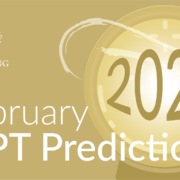



Leave a Reply
Want to join the discussion?Feel free to contribute!